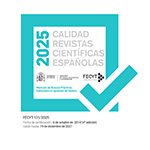Memories of resistance: Personal geographies of LGBTQ+ meaning in 1970s Barcelona
Abstract
Which spaces can be considered important in the LGBTQ+ history of Barcelona? And are there more everyday forms of resistance that are lost when the focus is placed on only the gay liberation activism of the 1970s and its demonstrations? To explore a broader understanding of what constitutes queer resistance, this article analyzes interviews conducted on the role of different spaces of Barcelona in the development of identity and LGBTQ+ communities. Inspired by the literature on oral history and on critical geography, this study emphasizes the personal and subjective elements of interviews conducted in 2021 with artists and activists who lived in Barcelona between 1970 and 1980. The role of literature, interactions with Francoist police, street fights, the pleasure in a queer flânerie, and intimate spaces of lesbian correspondence are the stories that this analysis revolves around. These memories present geographies of everyday queer resistance during the Francoist dictatorship and the subsequent Transition period and demonstrate the kinds of spaces that can be lost from view when commemorations emphasize only the most photographed and locatable events and spaces of LGBTQ+ activism in 1970s Barcelona.
Downloads
Article download
License
In order to support the global exchange of knowledge, the journal Cuadernos de Historia Contemporánea is allowing unrestricted access to its content as from its publication in this electronic edition, and as such it is an open-access journal. The originals published in this journal are the property of the Complutense University of Madrid and any reproduction thereof in full or in part must cite the source. All content is distributed under a Creative Commons Attribution 4.0 use and distribution licence (CC BY 4.0). This circumstance must be expressly stated in these terms where necessary. You can view the summary and the complete legal text of the licence.











